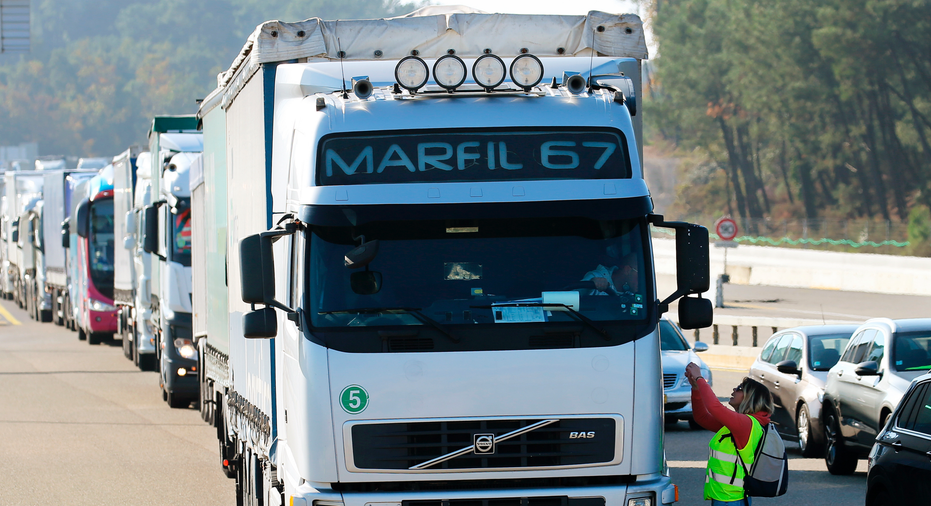French minister says fuel tax protests smaller, more violent
Demonstrators wearing yellow jackets open the toll gates on motorway at Benesse-Maremne southwestern France, Monday, Nov.19, 2018. The protests reflect broader frustration at President Emmanuel Macron, whose government is sticking to the fuel tax rise as part of efforts to clean up the environment. (AP Photo/Bob Edme)
PARIS – Citizen protests of fuel tax hikes are choking facilities critical to the French economy, and police have orders to remove the drivers blocking sensitive sites to show their anger, France's interior minister said Monday.
In a third day of actions, grassroots protesters blocked oil depots with their vehicles and disrupted English Channel traffic in a bid to keep up pressure on President Emmanuel Macron's government.
Interior Minister Christophe Castaner said the demonstrations around France had grown smaller while yielding "a multiplication of violent acts, racist acts, anti-Semitic acts and vandalism" since Sunday.
Scattered road blockades have continued around France since mass protests of the tax increases Saturday left one protester dead. An injured motorcyclist was between life and death, Castaner said.
Since the main protests on Saturday, 528 people have been injured — 17 seriously, the minister said. The figure did not include 92 police officers who were injured, two of them seriously.
He said that 27,000 protesters blocking strategic traffic zones were active on Monday, far fewer than the nearly 300,000 counted Saturday.
The government, under fire on other fronts and with Macron's popularity diving in polls, is walking a tightrope in dealing with protesters. Castaner said thousands of security forces were put in the field, mainly to protect the demonstrators.
The job of policing the protests was becoming more difficult and dangerous due to "the aggressivity and change in behavior of demonstrators...systematically confronting security forces," the minister said.
In the first sign of a get-tough response from the government, Castaner said the right to protest did not trump the free movement of people and goods. Those who disrupt traffic will be punished, he warned, noting that an individual quickly was convicted and sentenced to four months in prison.
Police were given orders to clear protesters away from fuel depots and other sensitive sites, three of which had been "liberated" so far, he said.
Protest representative Benjamin Cauchy said on France's RMC radio that drivers blocked about 10 oil depots Monday. They demanded a freeze on taxes that Cauchy said disproportionately hurt the working class.
French oil industry lobby UFIP said protesters blocked some of the country's 200 depots and slowed traffic at others, but couldn't give nationwide figures.
Protesters also blocked a highway leading to the tunnel used by Eurostar trains to Britain, Interior Ministry spokesman Frederic De Lanouvelle said. About 30 people were arrested overnight as police worked to remove protesters, a security official said.
The protests reflect broader frustration with Macron, whose government is sticking to the fuel tax rise as part of efforts to clean up the environment.
Protesters called for more national actions Saturday. They also said they were raising money online for the family of the protester who was struck and killed by a panicked driver.
Macron himself wouldn't comment when asked Monday about the protests. He referred to the Sunday night comments by his prime minister, Edouard Philippe, who vowed to keep the fuel tax hikes in place.
The protest movement represents drivers of various backgrounds, notably those who rely on their cars to get to work. The protesters called themselves "yellow jackets" after the safety vests French drivers are obliged to keep in their cars for emergencies.
Taxes on diesel fuel have gone up 7 euro cents (nearly 8 U.S. cents) and are to keep climbing in the coming years, Transport Minister Elisabeth Borne has said. The tax on gasoline is to increase 4 euro cents. Gasoline currently costs about 1.64 euros a liter in Paris ($7.06 a gallon), slightly more than diesel.





















